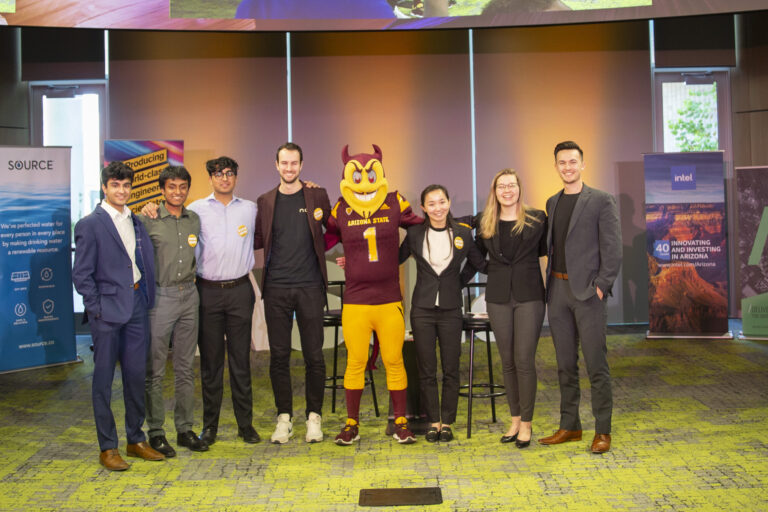
Fueling the future of entrepreneurship
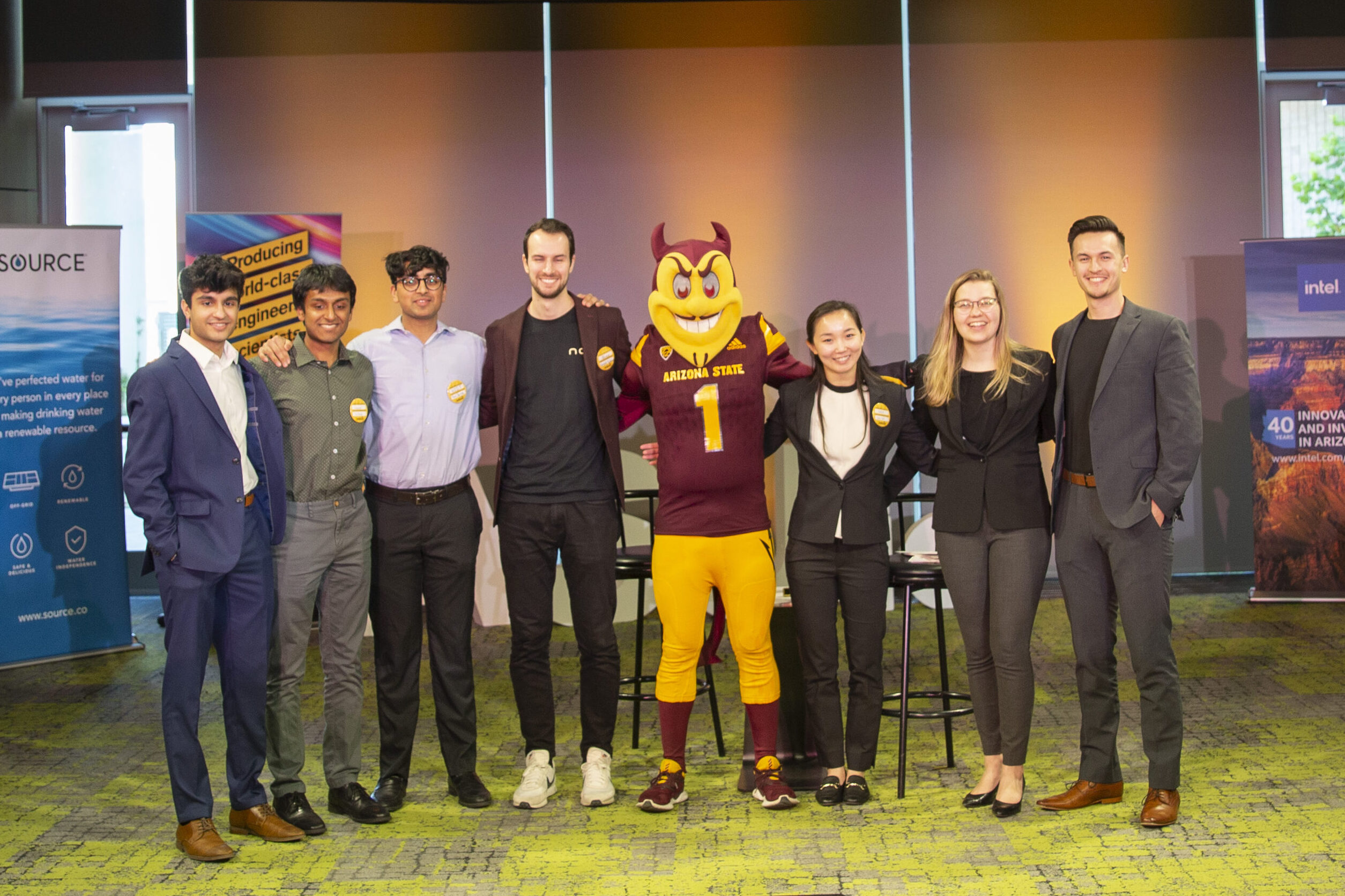
TEMPE, Ariz. — Last week, Arizona State University welcomed 25 collegiate teams to the ASU Innovation Open, known as ASUio.
Powered by the Ira A. Fulton Schools of Engineering at ASU, Breakthrough Energy Ventures and the ASU eSeed Challenge through the Prescott Student Venture Fund, ASU invites collegiate teams to pitch their startup ventures to business leaders and technology developers from across the Valley at ASUio. This year, the competition hosted semifinalists from 15 schools and three different continents who converged on the ASU campus for the chance to win more than $200,000 in non-diluted cash to support their ventures.
A team of judges, comprised of tech innovators, mentors, startup leaders and industry experts, had the difficult job of narrowing the playing field in one of the most competitive groups of ventures in the competition’s history.
Tom Prescott, director and former CEO of Align Technology, supports the Prescott Student Venture Fund and the ASU eSeed Challenge, which funds the competition’s top prize. He says a core tenet of ASUio serves to build a bright future for student founders.
“The genesis of ASUio was our drive to pay it forward so that wherever these founders and their ventures go, they will be able to compound opportunities for others and support the startup community,” Prescott says.
ASU is a prominent institution for up-and-coming entrepreneurs, partly due to the help of its intellectual property management company, Skysong Innovations, which has facilitated more than 200 startups out of ASU. Skysong innovation startups have raised over $1.2 billion in external funding, and have generated more than $2 billion in economic output in Arizona alone.
Max Derbyshire, chief operating officer of Acorn Genetics, a biotech venture using gene sequencing diagnostics, appreciates the support of events like ASUio.
“This is where student startups truly start,” Derbyshire says. “Without the initial funding of university pitch competitions and the support of incredible institutions like ASU, these new ventures don’t reach the next stage.”
This year saw the return of previous ASUio winners Jonathon Barkl, founder and CEO of AirGarage; Alicia Chong-Rodriguez, CEO and founder of Bloomer Tech; and Casey Grage, founder and CEO of Hubly Surgical.
Barkl and Chong-Rodriguez discussed their venture’s progress after winning ASUio and answered questions from the audience. Grage performed a practice pitch to a group of judges to showcase her product and discuss the nature of pitching.
“Since the last time I came here, I’ve been growing personally and the company has as well,” Chong says. “Seeing so many familiar faces today reminds me of how grateful I am to have been part of this ecosystem.”
Kyle Squires, ASU’s vice provost of engineering, computing and technology and the dean of the Fulton Schools, views entrepreneurship as a vitally important complement to students’ growth and learning experiences as they train to become the engineering and technology leaders of the future.
“Entrepreneurship and innovation are in the fabric of our school and it shows through the ideas, ventures and pitches shown today,” Squires says.
Along with guidance from some of technology’s most influential voices, students in the competition receive support from generous sponsors and dedicated mentors who donate their time and resources to the ASUio competitors.
ASU sponsors include the Fulton Schools and the Arizona Board of Regents, with additional support from ASU’s J. Orin Edson Entrepreneurship + Innovation Institute, the ASU Mayo MedTech Accelerator and the ASU Knowledge Enterprise. Alongside the prize sponsors, representatives from several entities participated as mentors and provided in-kind support, including experts from Altium, Amazon, the Arizona Commerce Authority, August United, Mayo Clinic Arizona, Solid Works and GoEngineer, SRP, Theil Capital and Zenni Optical, among others.
Cody Friesen, one of the architects of ASU’s most far-reaching pitch competition and the CEO of SOURCE Global, is a longstanding supporter of the event.
“We have been running ASUio for seven years now and each year, it gets better,” Friesen says. “Every year, we see young people coming up with phenomenal ideas that can advance our society sustainably and while lifting others.”
This year, winners can look forward to yet another opportunity exclusive to the ASUio experience. A select group of competitors were selected to participate in the reality show Entrepreneur Elevator Pitch. The weekly show has garnered more than 156 million views on Entrepreneur.com and other platforms in its past six seasons.
And the winners are…
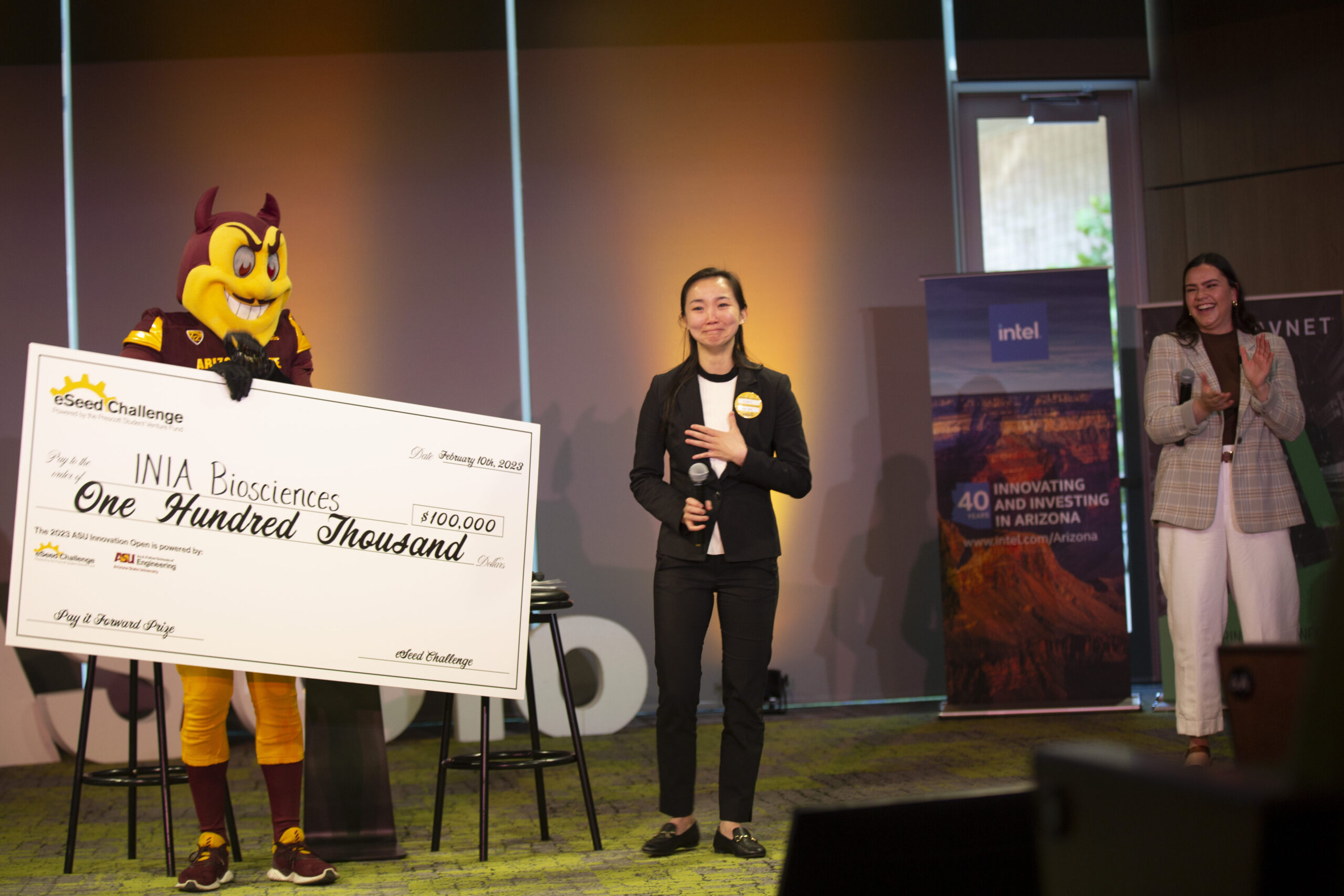
INIA Biosciences received the $100,000 Pay It Forward prize sponsored by the ASU eSeed Challenge for their work in harnessing the power of ultrasound stimulation to modulate the immune system to manage chronic inflammation for psoriasis patients. Existing medications have an extensive side effect profile that rivals their benefits. By encouraging patients to trade pill bottles for a wearable device, INIA Biosciences plans to shift the treatment paradigm for the skin condition.
Shen Ning, co-founder and CEO of INIA Biosciences and Boston University graduate student, accepted the award on behalf of her team.
“This support will help us develop our portfolio and prototype to get clinical trial ready and it means so much to see our work recognized,” says Ning.
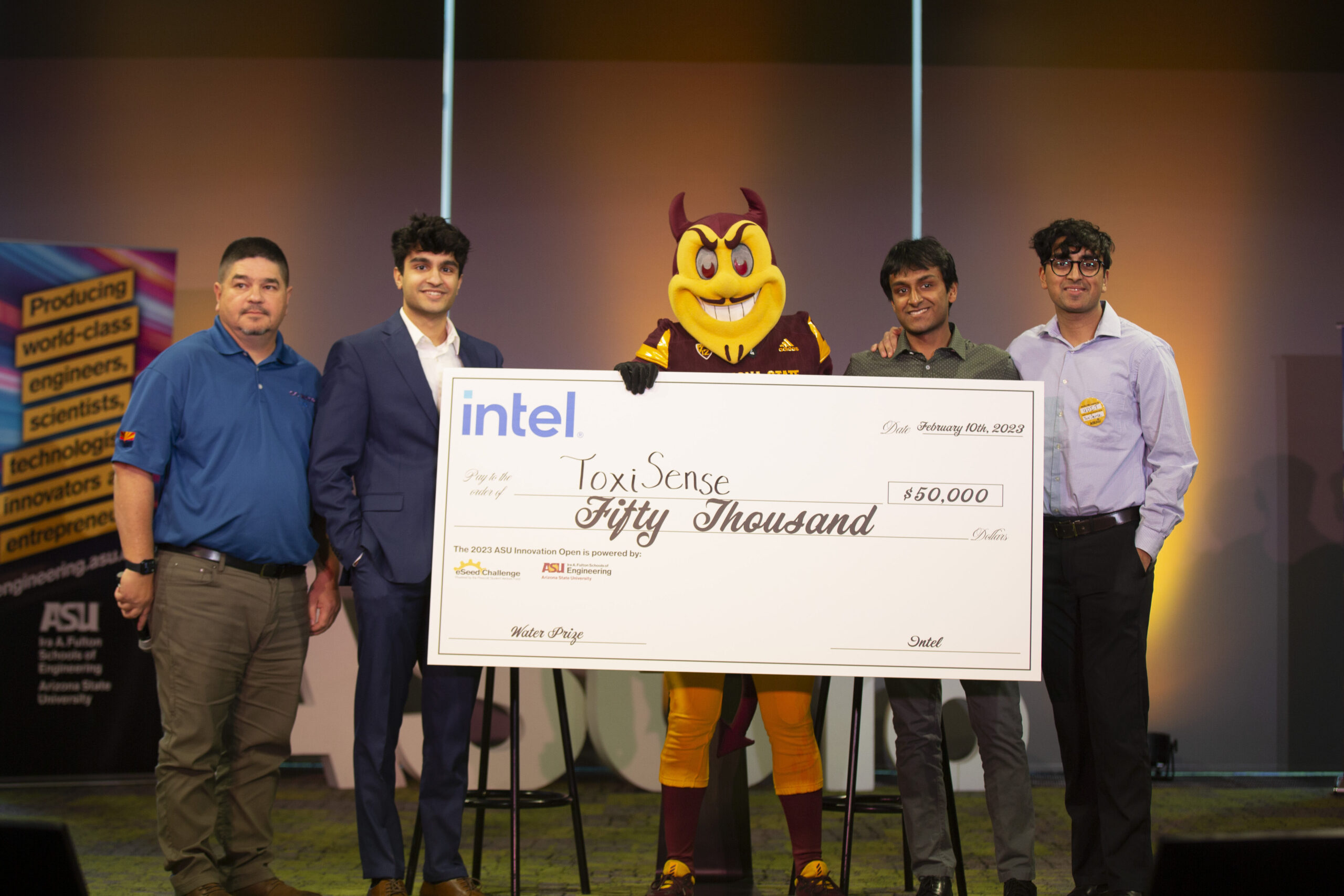
The $50,000 Water prize was awarded by Intel to ToxiSense for their water testing technology, which provides alternative and sustainable methods for endotoxin water tests. Currently, the health care industry relies heavily on bioproducts from the horseshoe crab to perform endotoxin water testing, causing an environmental strain on the species and financial demand for the medical device community.
ToxiSense has genetically engineered a plant to glow at different intensities based on the presence of endotoxins at a significantly cheaper cost than the industry standard without environmental damage. Aarush Sahni, the chief science officer of ToxiSense and an undergraduate student at the University of Pennsylvania, expressed the team’s gratitude.
“This prize will catalyze our research and development process to secure our patent,” Sahni says.
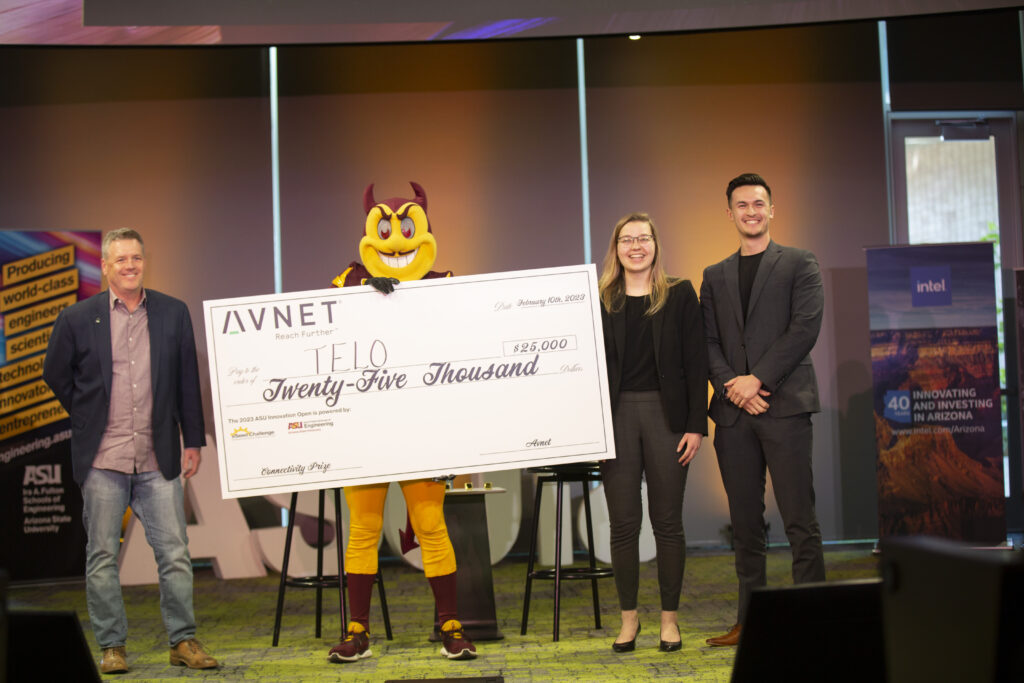
Telo earned the $25,000 Connectivity Prize, sponsored by Avnet, to develop ergonomic walking aids that can collect data from the user for physical therapists. Morgan Kerfeld, Telo’s founder and a University of Minnesota graduate student, says the award is a major step for the company’s journey.
“Winning a prize here will allow us to be able to work on Telo full time and help us secure intellectual property for our inventions,” Kerfeld says.
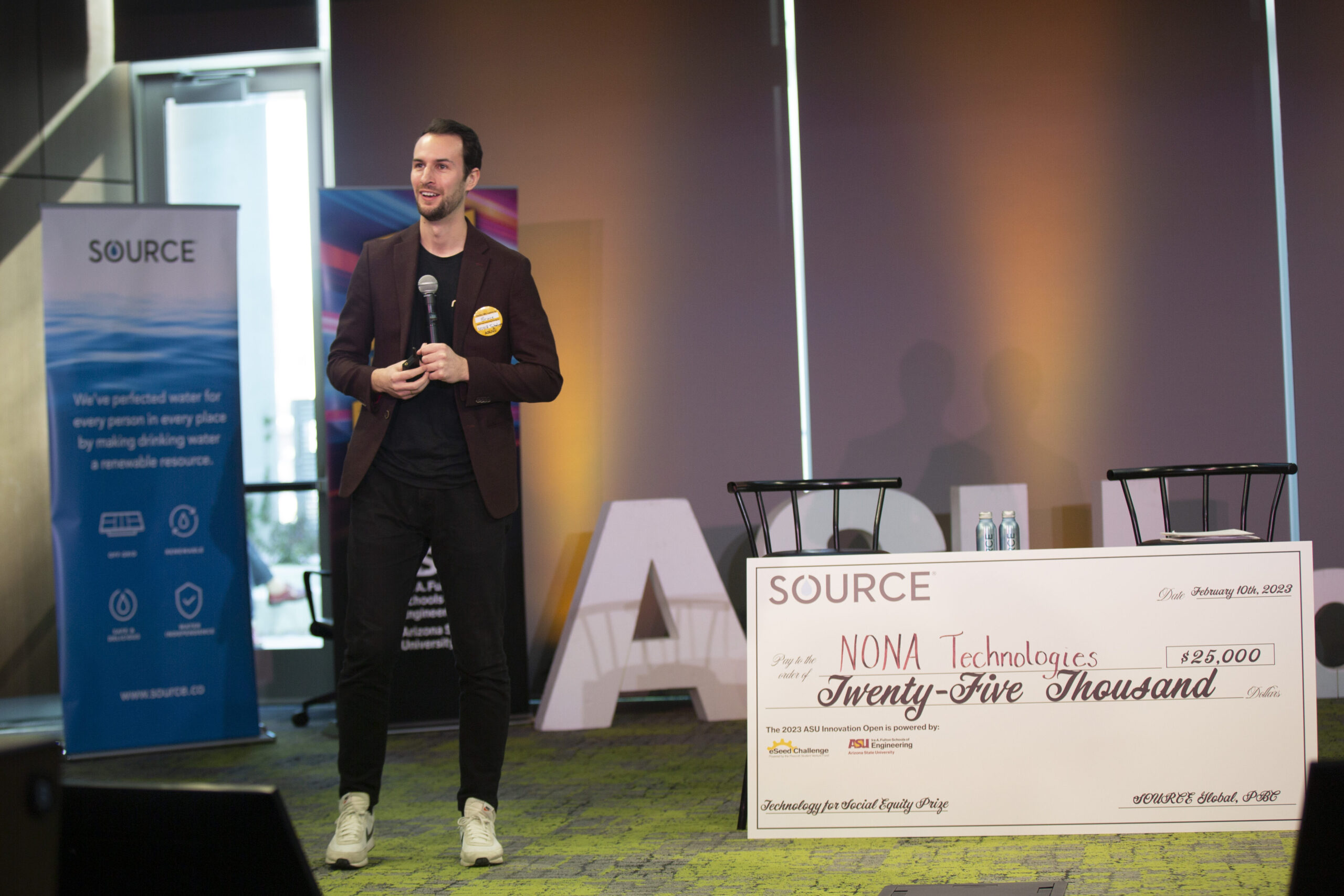
The $25,000 Global Technology for Social Equity prize, sponsored by SOURCE Global, was awarded to NONA Technologies for their sustainable water desalination solution. Bruce Crawford, the co-founder of NONA Technologies and MIT graduate student, appreciates the opportunity to advance the company.
“It has been a great experience to come and learn from the judges,” Crawford says. “We have been working on this for six years and are finally at the point where we can support human life with these devices.”
After six years of competition, ASUio continues to gain ground as one of the signature pitch competitions for ASU, which has maintained its standing as the nation’s most innovative university and is a breeding ground for entrepreneurial activity, as evidenced by its place as a top producer of patents among universities around the world.
ASU is also No. 1 in the nation for global impact in advancing the United Nations’ Sustainable Development Goals. Sierra Magazine also ranked ASU as its top “coolest school” in its sustainability rankings. Phoenix is considered the seventh-best startup city in the U.S. and top 20 globally.
Stay tuned for more news about ASUio here and watch a recording of the live competition on YouTube.